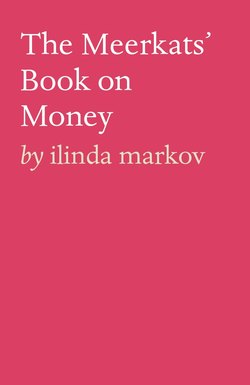Читать книгу The Meerkats’ Book on Money - Ilinda Markov - Страница 5
На сайте Литреса книга снята с продажи.
ELIZABETH
ОглавлениеPlaying the piano with one hand was my mother’s way of expressing her loneliness.
From a distance measured in umbilical cords, I watched her sway dreamily into something mythical, half-fairy, half-music, the chimes of the long-case clock you were was so afraid of, rupturing the melancholy. Balancing on a taboret, occasionally, your mother moved the clock hands at a whim and the chimes merged as she composed her own music, the clock another instrument transcribing her grief.
“You know, Elizabeth,” she would say. “Beethoven also created pieces for mechanical clock.”
He was also there, a heavy noise churner, a loud boisterous talker, coughing, grunting, snorting, slamming doors, trumping around with the thundering steps of a gargantuan man who loved his roast rare, his wine the red of bull blood, his arrogance satirical , his belief in the power of money obsessive. The father. His smell, acidy and pungent, not unlike that of the bull Mastiffs he kept locked up and hungry for his hunting adventures, was scary, wasn’t it?
During the day when the father was away, I could follow my mother and was allowed into her room, where I could sit and watch her delicately tap cream into and gently massage her small bony hands or giving them a nervous rub, fearing that one day they might cramp on her, leaving her without the only enjoyment she had, touching, caressing the piano, merging with the abundance of harmonised sounds from a beautiful yet unattainable world of happiness and freedom. She wanted to give me piano lessons, hoping that I might follow in her shoes, but the father was prepared for it and the ban came with a categorical fierceness I was to stay away from what he called “her piano madness”.
A graphite vase in the shape of an art-deco stylised amphora held a bouquet of off-white artificial flowers on the piano’s top. The flowers represented someone’s idea of lilies or tulips, or both, the stems wiry, thin, the leaves long and oval, the off-white petals made of crispy yet dull material. I wondered what those dead flowers were doing there next to the portrait of Franz Liszt in his late years. He looked to me more like a sorcerer than a composer, the white strawy hair, the long, misshaped nose hanging over a clamp-like mouth, the warty wrinkled face. The portrait, frightening as it was, revealed to me that old age was a lethal thing; Liszt was like a messenger of death and I couldn’t wait to see my father who was quite older than my mother succumbing to it so I and her could continue their journey into her piano madness without him.
The artificial flowers and their deadliness were in full contrast with the father’s desk ornaments, acquired mostly through antiquity auctions. The objects had a poignant masculine quality about them, a life and dynamics of their own. A miniature sculpture called guns and games representing a coarse metal hook on a stand, a set of knives and a rifle hanging from it along with several dead ducks and pheasants, a retriever at the base of this bronze miniature looking proudly at the catch. A glass top box with ancient Roman coins, (my mother had once sighed, money can’t buy anything for the soul). A collection of silver-capped liquor crystal decants. A sand watch I liked to play with by turning it upside down, watching in awe the fine sand grains travel through the narrow throat. It was a simple glass thing on a square-shaped stand with Tempus fugit written on it.
“Time flies,” my father translated it for me while warning me again and against going inside the piano madness. Inside the music. “And time is money!”
“Money can’t buy anything for the soul,” echoed my mother playing her favourite and very melancholic Camille Saint-Saens’ 6 Etudes for Left Hand.
